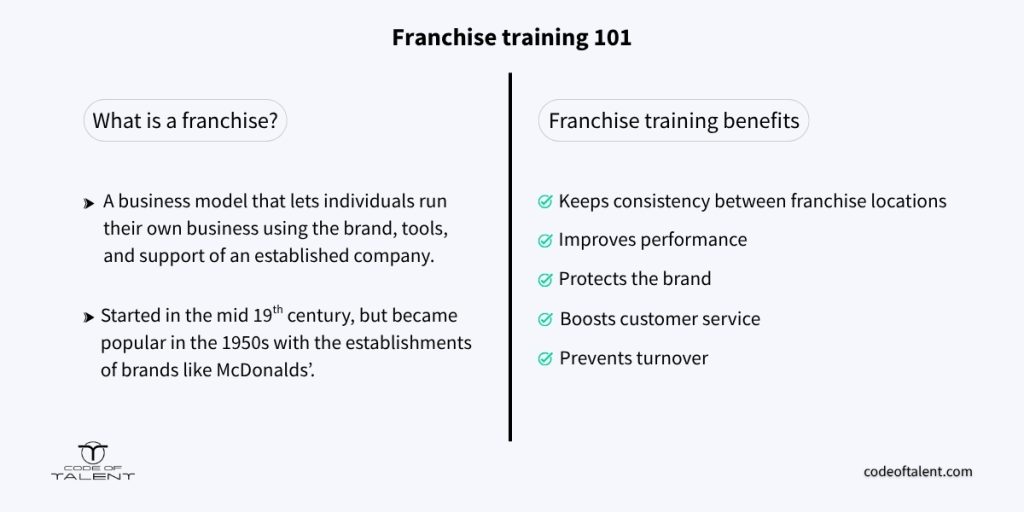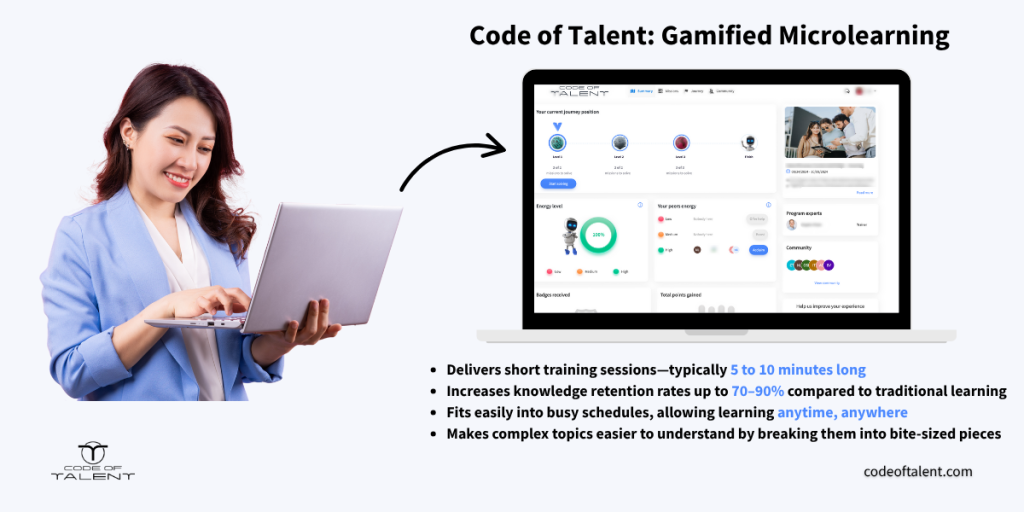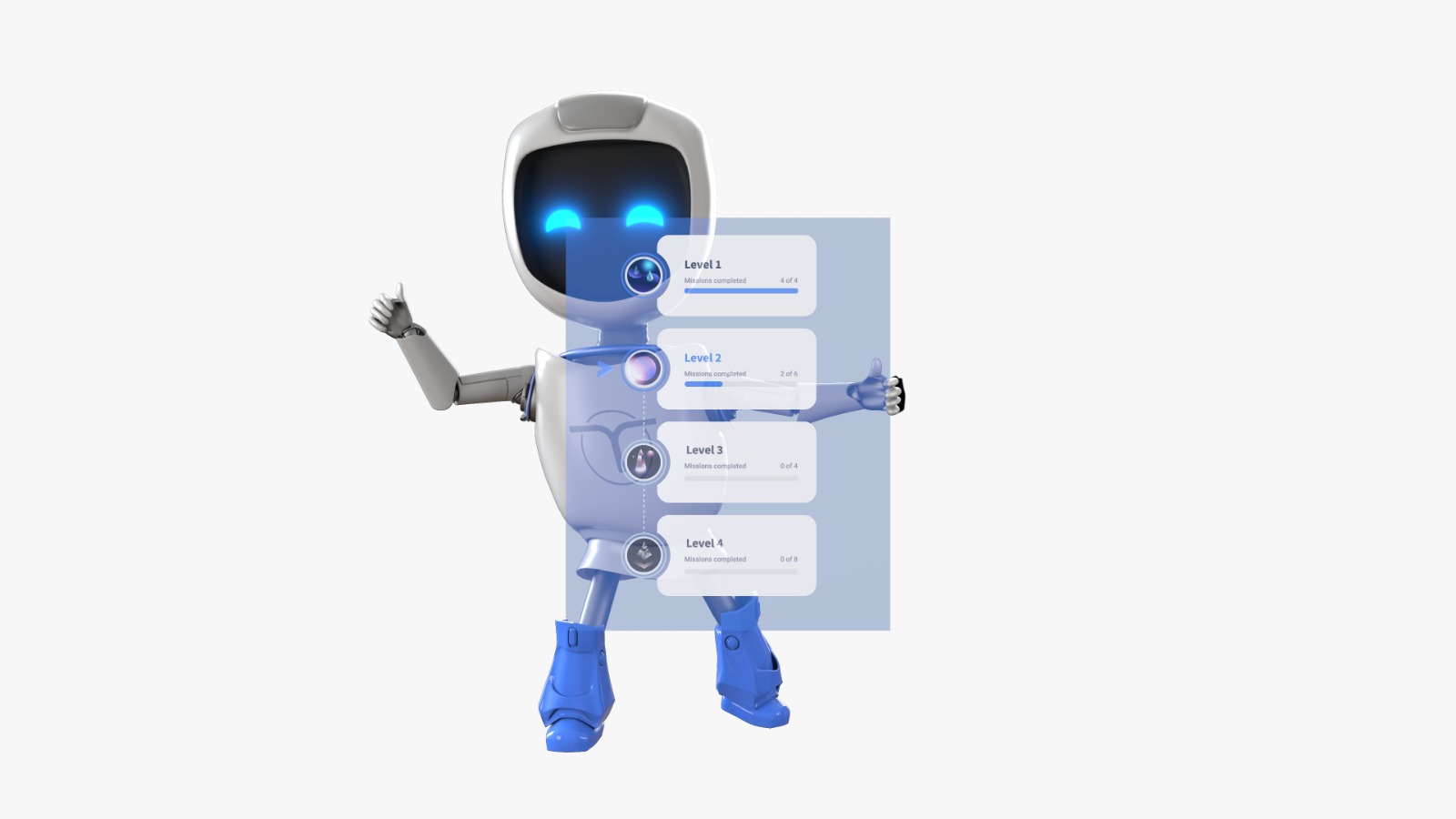A strong franchise training program is what turns a good hospitality brand into a great one. It’s how you make sure every customer experience feels consistent and on-brand, no matter the location.
Franchising plays a huge role in the U.S. economy, supporting 7.6 million jobs and generating $674.3 billion in output, or 2.5% of the country’s GDP, according to Franchising.com). But none of that works without a clear way to train new franchisees and their teams.
Take McDonald’s for example (the biggest franchise in the world). Its rigorous franchise training program spans 12–18 months and combines hands-on learning in a restaurant, part-time study, and one-on-one coaching. That structure is what helps them deliver the same customer experience in every location, every day.
What Is a Franchise Training Program?

At its core, a franchise is a business model where a company (the franchisor) licenses its brand, products, and operations to independent owners (franchisees) who run individual locations.
In return, the franchisee agrees to operate under the franchisor’s system and standards. This setup allows brands to grow quickly while maintaining consistency across multiple locations.
A Brief History of Franchising
According to IFA, franchising dates back to the mid-19th century, when Isaac Singer created a network of agents to sell and service his sewing machines. But it wasn’t until the 1950s and 60s, with the rise of fast-food brands like McDonald’s and hotel chains like Marriott, that franchising became a go-to strategy for scaling service-based businesses across the U.S. and beyond.
Why Franchise Training Matters
A franchise training program is the system that teaches franchisees and their staff how to run the business the right way—from operations and branding to customer service and compliance. For hospitality businesses, that means making sure a guest’s experience is just as smooth and enjoyable whether they walk into a hotel in Miami or a quick-service restaurant in Minneapolis.
Training doesn’t just help with consistency, but it also pays off financially. A study by the Association for Talent Development found that companies in the top 25% for training investment saw 24% higher profit margins, 218% more income per employee, and 26% stronger price-to-book ratios compared to those in the bottom tier.
In short, a franchise training program means:
- Protecting the brand
- Improving performance
- Delivering customer experience that brings people back.
Why Franchise Training Is Critical in the Hospitality Industry
The hospitality industry continues to grow at a staggering pace, reaching $4.9 trillion in 2024, per EHL Hospitality Insights. In the U.S. alone, according to the National Restaurant Association, the foodservice sector is projected to hit $1.5 trillion in sales by 2025, making it one of the largest segments in the global economy.
But despite the growth, the industry faces a well-known and costly challenge: turnover. According to McKinsey, frontline industries like hospitality and retail experience employee turnover rates of 60% or more, some of the highest across all sectors.
This is where a strong franchise training program becomes a game-changer.
Benefits in Having a Franchise Training Program in Hospitality
Well-designed training creates a sense of purpose, confidence, and consistency among staff. It helps teams perform better, stay longer, and represent the brand in a way that builds trust with guests.
In hospitality, the impact of training shows up in real ways:
- Higher guest satisfaction scores
- Stronger online reviews
- Greater brand loyalty and repeat visits
- Lower turnover and smoother onboarding for new hires
Challenges in Scaling Training Across Franchise Locations
As essential as training is, scaling it across multiple franchise locations, especially in the hospitality space, comes with a unique set of challenges.
1. Inconsistent Brand Standards
When training isn’t uniform, service quality and brand presentation can vary widely between locations. One hotel might deliver on-brand guest service, while another misses key details, damaging brand trust and online reputation.
2. Language and Cultural Barriers
International franchises often operate in multiple languages and cultural contexts. A training video that works in New York may miss the mark in Dubai or Bangkok. Without localization, important details get lost, and with them, the guest experience.
3. Compliance and Execution Gaps
Not all franchisees follow the rules to the letter. Whether it’s food safety protocols, data protection issues, or internal policies, a lack of training oversight can lead to inconsistent execution, or worse, compliance risks.
4. Technology and Access Issues
Many hospitality brands still rely on outdated or disconnected systems to deliver and track training. Without a centralized learning platform, it’s hard to know who’s completed what, what’s working, and where gaps exist.
Core Components of a Strong Franchise Training Program
For hospitality brands, where daily operations directly affect customer satisfaction, each part of the franchise training program must be intentional for both the business and the employees.
Below are some of the most important aspects of a successful franchise training program for hospitality teams.
1. In-Line with Business Goals
Not all franchises operate the same way, even if they’re in the same industry. According to MSA Worldwide, each franchise may differ in:
- Company culture
- Marketing approach
- Consumer positioning
- Brand standards
- Product prep methods
- Service types
- Operating procedures
- Site development
- Supplier networks
- POS and IT systems
- Franchisee support models
That’s why a great training program must reflect your specific brand’s values, customer promise, and operational structure, not just general best practices.
Tip: The first step in building a strong franchise training program is to look at your main business goals and KPIs. Ask: What are we trying to improve through training?
- Want higher online ratings? Focus on upskilling to improve how staff interact with guests.
- Dealing with costly hygiene issues? Reinforce cleaning protocols and compliance training.
- Have a signature dish that’s underperforming? Offer menu knowledge and upselling training so servers can recommend it better.
2. Onboarding
The first few days set the tone. A structured onboarding process gives new hires clarity, confidence, and a sense of purpose from day one. It introduces your brand’s expectations, operating procedures, and culture, reducing time to productivity significantly.
According to The HR Digest, well-structured onboarding can improve new hire productivity by over 70%. That’s critical in hospitality, where teams often need to get up to speed quickly without sacrificing service quality.
Tip: Hospitality employs a lot of employees without experience for which the onboarding process can become overwhelming. Consider making it as interactive as possible but still maintaining practicability.
Use simple tools like:
- Task proofing (e.g., uploading a photo of a correctly set table)
- An “ideas hub” where team members share service tips or guest feedback
- Micro-challenges or checklists that turn onboarding into a guided experience
3. Product/Menu Training
Whether it’s plating a signature dish or describing a new drink special, product training ensures that staff understand exactly what’s being sold and how it should be prepared and presented.
In hotels, product knowledge means understanding all services (like spa packages, parking policies, or room upgrades) as well as how the property is structured and operated.
Tip: Check out our article on menu knowledge training for in-depth tips and tricks on learning the menu without relying only on memorization.
4. Branding Training
Your brand is more than a logo. Staff should know how to speak, act, and present themselves in ways that reflect your identity: visually, verbally, and experientially. From uniforms to how team members greet guests, branding training helps create a cohesive experience.
Tip: Introduce your brand’s founder or CEO early in the training journey. As the face behind the brand, they bring authenticity, vision, and inspiration that no manual can replicate.
Here are a few ways to make that connection:
- Kick off training with a live (or recorded) welcome session led by the founder or executive team
- Use them in training videos to demonstrate key procedures or share the “why” behind the service philosophy
- Deliver personalized messages from leadership after each major training milestone (e.g., “Great job on completing the onboarding module!”)
- Offer 1-on-1 coaching or Q&A sessions for top performers each quarter or year
5. Sales Training
Effective hospitality employees are also salespeople. Teaching upselling, cross-selling, and suggestive selling techniques can improve check averages without being pushy. For example, a front desk associate who can recommend a spa package or a server who can suggest a premium pairing adds value to the guest and to the business.
Tip: Run classic sales enablement training modules, but tailor them to the hospitality context. In this industry, selling isn’t about pushing products, but about understanding the guest’s needs and offering the right solution. Hospitality sales should feel helpful, not transactional!
Train staff to:
- Listen actively
- Ask the right questions
- Read body language cues
- Match the offer to the guest’s preferences or situation
6. Soft Skills
Hospitality runs on people skills. Training should cover areas like communication skills, emotional intelligence, conflict resolution, and time management. These skills are essential for strong guest relationships, and upskilling should be a top priority in any hospitality customer service training.
Tip: The most effective way to train soft skills is through role-playing, scenario-based exercises, and self-reflection. These methods go beyond theory by putting team members in realistic guest-facing situations.
By stepping into the guest’s shoes, staff can:
- Practice empathy in action
- Strengthen their ability to read emotional cues
- Improve response strategies in moments of tension or service recovery
7. Customer Service
This is the frontline of your brand. Staff need to be trained on basic customer service skills, how to handle complaints, and how to stay on-brand even under pressure. The tone, language, and response time can make the difference between a glowing review and a lost customer.
Tip: Train your team to respond, not react.
In hospitality, not every guest interaction goes as expected, but how your staff responds makes all the difference. Teach them to pause, listen fully, and acknowledge the guest’s concern before jumping to a solution.
Use the L.E.A.R.N. method as a go-to framework:
- Listen actively
- Empathize sincerely
- Apologize when needed
- Resolve the issue
- Notify leadership or log the feedback
8. Compliance and Safety
Especially in foodservice and lodging, compliance is non-negotiable. From health and safety regulations to OSHA standards, staff must be trained to meet all local and federal requirements. This not only protects your guests and team, but your business from legal and reputational risk too.
Tip: To fix that, break it down into short, focused lessons (ideally under 10 minutes each). This microlearning approach reduces cognitive overload and helps employees absorb information gradually, not all at once.
And with the help of AI, transforming compliance training materials into short training modules takes only a few minutes.
9. Leadership Training
Managers and franchise owners need a different set of tools. Coaching for leadership, team development, delegation, and decision-making ensures that those in charge are prepared to lead, not just manage. Strong leadership training helps maintain a unified brand culture across all locations.
Tip: Most new supervisors or franchise owners come from frontline roles, not formal leadership backgrounds. Go beyond scheduling and operations and focus on coaching, conflict resolution, and team motivation.
Use real scenarios from your business, and include modules on:
- Giving constructive feedback
- Leading by example during peak service
- Managing stress and setting the tone for the team
Best Practices for Delivering Franchise Training
A well-designed franchise training program is all about how it’s delivered. Hospitality businesses, in particular, thrive on real-time learning, emotional intelligence, and brand consistency across locations. Here are key practices that make training stick and scale.
1. Begin with Theory, Reinforce with Practice
Start with the “why” behind your standards, then move into hands-on application. Whether it’s folding linens, presenting a dish, or managing a difficult guest, employees learn faster when they understand the reasoning and then get to try it themselves.
2. Use a Dedicated Learning & Development (L&D) Team
Franchises may run like independent locations day-to-day, but behind the scenes, they function like one large organism. That’s why it’s essential to have a central training team or department, no matter the size of your network.
L&D team’s role is to:
- Oversee training progress across all locations
- Keep materials current and aligned with evolving brand standards
- Adjust strategies as needed based on feedback or performance
- Manage and support local trainers for consistency
3. Introduce Microlearning Modules
In hospitality, time is tight, especially during high seasons. Instead of long training sessions, break topics into short lessons that staff can go through in under 10 minutes. This approach is called microlearning and is slowly taking over the hospitality training scene.
Think one topic at a time: how to greet a guest, how to upsell a dessert, how to check spa availability in the system. These smaller modules are:
- Easier to digest
- Quicker to complete
- More likely to be remembered when the pressure is on.
Microlearning also works well for ongoing refresher, which is perfect for new menu launches, safety updates, or seasonal offers.
4. Incorporate Gamification and Interactive Elements
Make training more engaging with gamification (badges, completion trackers, and even friendly competition). A little play goes a long way, especially in environments that are high-pressure.
When staff feel like their learning progress is seen and valued, they’re more motivated to take part and more likely to remember what they’ve learned.
5. Customize Training Per Role and Department
A server doesn’t need the same training as a front desk agent or spa manager. Personalize modules based on job function, so employees spend time on what’s relevant to their day-to-day role.
6. Reflect Brand Identity in All Training Materials
Make the training feel like your brand. Use visuals of your actual locations, real team photos, and messages from leadership. Showcasing team-building events, site walk-throughs, and executive intros helps humanize the brand and reinforce your culture.
7. Use Centralized Tracking Systems
Invest in systems that let you track training progress across all locations. This might be a microlearning platform with dashboards, an interactive map, or even a shared calendar.
What matters is that you can see who’s trained, who needs support, and where consistency might be slipping.
8. Implement Recognition and Reward Systems
Recognition and rewards are some of the strongest motivators for employees. Treating training as a key milestone in an employee’s journey and celebrating it accordingly can boost engagement more than almost any other approach.
Get creative with your rewards. Some examples include:
- Free books or wellness kits
- Spa treatments or vouchers to popular brands
- Discounts on your own services or products
- Public shout-outs or “Employee of the Month” recognition
- Access to advanced training and leadership certifications
How to Evaluate and Improve Your Franchise Training Program
A great training program is never finished, as it needs ongoing evaluation and updates to stay effective and relevant.
Gather Feedback from Franchisees and Trainees
Regularly ask for input through surveys or interviews. Franchisees and frontline staff can provide invaluable insights on what’s working, what’s confusing, and where more support is needed.
Track Key Performance Indicators (KPIs)
Use data to measure training success and the real-world impact of your training efforts. Important KPIs include:
- Employee retention rates
- Guest satisfaction scores and online reviews
- Average ticket size or upsell rates
- Training completion rates
Conduct Audits and Mystery Shopper Evaluations
Spot-check operations and customer service firsthand with audits or mystery shoppers. These evaluations highlight inconsistencies and training gaps that numbers alone can’t reveal.
Keep Training Content Up to Date
As your brand evolves and technology changes make sure your training materials evolve too. Regular reviews and updates help keep everyone on the same page and ready to deliver the best experience.
Conclusion
A strong franchise training program is essential to building consistent, high-quality guest experiences across every location. By focusing on clear goals, relevant content, engaging delivery, and ongoing evaluation, hospitality franchises can reduce turnover, improve customer satisfaction, and grow brand loyalty.
To make this process easier and more effective, consider turning to Code of Talent, a modern learning platform designed to simplify and elevate franchise training. Here’s what sets Code of Talent apart:
- Easy-to-use platform with interactive content
- Microlearning support for bite-sized, mobile-friendly training
- Gamification features like badges, points, and leaderboards to increase engagement
- Centralized tracking to monitor training progress
- Flexible integration with your existing systems and branding options
- Robust analytics to measure training impact and identify improvement areas

Whether you’re launching a new training program or looking to improve an existing one, Code of Talent offers the tools and support to make franchise training simple, consistent, and effective.
Start your journey today with Code of Talent’s free trial and experience firsthand how a modern franchise training program can transform your hospitality business!





